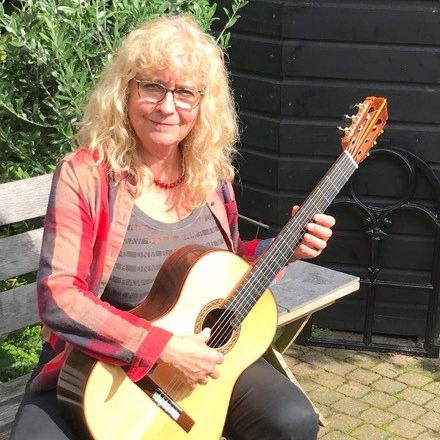Six Golden Rules voor het overwinnen van Podiumangst
Dit is een artikel over hoe om te gaan met podiumangst en hoe je dit kunt tegengaan.
by David Leisner
Reprinted by permission of the American String Teachers Association,
copyright 1995, first printed in American String Teacher, Spring 1995
Performance anxiety can begin so innocently. First you notice someone in the front row tapping his feet. You wonder to yourself whether you’re really maintaining a steady beat. Then someone else whispers something to her neighbor, and you worry that perhaps your hair is disheveled or your tie is crooked, or maybe you’re making those funny grimaces again that you thought you’d conquered. Worse yet, they are probably discussing how strange or inappropriate your interpretation is, or they are commenting on how many notes you are missing (you are missing a lot by now). Oh, your teacher is really going to yell at you. And your girlfriend or boyfriend is going to be very disappointed. Your students aren’t going to know what to say to you because this is going so badly. Your hands are shaking or sweaty or cold. Maybe you’re not cut out for this stuff after all…
Sound familiar? Believe me, you’re not alone. Performance anxiety affects almost everyone, from the beginner to the most seasoned professional. It is truly remarkable what paranoid ingenuity most of us generate during performance in order to defeat ourselves.
It all begins when our minds wander. Some distraction, usually minor, occurs, and we become less and less able to concentrate. The results are nervousness, memory lapses, technical errors and general discomfort with and, ultimately, fear of performing. The whole mess can often be avoided quite simply by thinking a few essential thoughts before going on stage. A few years ago, after experiencing a string of unpleasant performances much like the description above, I did a lot of soul-searching about what kinds of thoughts and feelings were distracting me in performance and what advice I could give myself to counteract them. The result was Six Golden Rules that summarize issues crucial to successful concentration in performance.
I meditate on these a few minutes before going on stage. Ever since the beginning of this practice, I have had very few concentration lapses in concert and have found performing to be far more fun and satisfying than ever. In addition, my students and all those with whom I have shared these ideas have had similar benefits, and have been astonished at how quickly their performance anxiety dissolved.
GOLDEN RULE ONE
Before performing, you must first remind yourself that you have practiced to the best of your ability. You have used your practicing skills in the most effective way you know at this time. True, your playing can always be better, but given all the circumstances that have led to this moment, you have, in fact, done your best.
Now the time to practice has passed. Rather, you are going to use your “automatic pilot,” which you have been training during practice sessions. The automatic pilot (a.p.) is at work, for example, when you learn the fingering for a piece. When you repeat and reinforce the new patterns, the a.p. retains them, so that when you go on to practicing, say, dynamics, you don’t have to think too hard about the fingering.
The most comforting aspect of the a.p. is that it works all by itself. It is indeed automatic. So when it is time for you to perform, all you need to do is trust your a.p. to do most of your work for you. No effort or thought is required to bring back all that you have practiced. It will be there for you.
GOLDEN RULE TWO
Do not judge what just happened or is about to happen. Self-judgment during a performance is futile because it takes you out of the present and into the past or future and destroys the natural flow of your thoughts and physical actions. Whether the judgment is positive or negative, it introduces a verbal aspect into an activity that is most successful when it is non-verbal. Reserve judgment for after the performance, preferably after you have listened to other people’s reactions.
Rather than judge your playing, simply observe it without verbal description, and motivate your intentions. When you are about to make a crescendo, for example, intend to do it and then feel it as you are doing it. There is nothing verbal about this process. You are, rather, putting intention into action – that is, motivating.
GOLDEN RULE THREE
Do not second-guess any audience member’s reaction to your playing. During a performance most of us feel quite certain we know exactly what the responses to our playing are by our teachers or students or colleagues, boyfriend or girlfriend or spouse, critic or some illustrious musician we happen to spot in the audience. More often than not, these thoughts prove to be completely, ludicrously inaccurate and only serve to further remove us from the moment and the music.
An example: I was once playing an informal house concert, with no more than fifteen people in the audience. As soon as I came out to perform, I noticed one person who looked familiar, but whom I could not identify. For most of the first piece, I was not thinking about the music, but rather about who he was. Finally I concluded that he was a respected vocal coach and accompanist I once met briefly. He was undoubtedly going to listen to the Schubert lieder arrangements on my program with an acute perception of detail and, ultimately, I was sure, with disdain. Not only during the Schubert, but throughout the entire concert, I was obsessed with thoughts like these. Not surprisingly, the whole experience was quite unpleasant for me. Afterward, when he came to speak to me, I discovered that this so-called vocal coach was, in fact, a bassist, and he had nothing but enthusiastic praise for my performance.
Later I thought, “what an incredible waste of energy!” How remarkable it is that the vast resources of one’s imagination can be used for such futile, self-destructive mind-games! You probably have had similar experiences. Trying to imagine what someone in the audience is thinking about your playing is useless and distracting. Please yourself only.
GOLDEN RULE FOUR
Be on stage, not in the audience. Be in the giving mode, not the receiving one. Be in the music, in the moment. These are three ways of saying more or less the same thing. You cannot be performer and listener at the same time. Leave the response to the audience. Your task is to communicate to the listener what you have practiced, thought about and felt. The most effective way of accomplishing this is by being present in the moment and not by dwelling on any moment that is past or one that has not yet occurred. A good example of this is when you are reading a piece of music that is familiar to you and your eyes follow the notes at a natural, steady pace. The reading feels easy, and your music-making is accurate and relaxed. This is the kind of forward flow that is desirable in performance.
GOLDEN RULE FIVE
Single out one aspect of your playing that is the top priority among things you need to be reminded of at this time. Think about this not when you are performing, but before you go on stage, when you are thinking about the other five Golden Rules. Some people, for instance, may wish to emphasize posture. Some might need to play with less pressure, while others may need a reminder to play more boldly. The variety of issues to consider here is infinite, as they are specific to the individual and they may evolve over time, depending on what is top priority at the moment. Choosing more than one item to consider, however, would only burden your abilities to concentrate, so choose carefully.
GOLDEN RULE SIX
Enjoy! Don’t forget that your performance is the time when you can finally share with your listeners what you have worked so hard in the practice room to achieve. This is a time of joy and not a time for correcting errors or other faults. Players tend to be too self-critical in performance. The practice room is the place for that. The concert hall is the place for celebrating the music. Let your emotions for the music be present. Don’t allow minor details to obscure your feelings about the music. Let your excitement for the music be present. Let the adrenaline and your genuine lively passion for the music come through.
REVIEW BEFORE PERFORMING
These are my six Golden Rules. I recommend that you look at them five to ten minutes before going on stage. Think about what each one means to you as an individual. As you look at Rule Three, for instance, you might think about specific people who might be in the audience and, one by one, remind yourself that you are not going to second-guess their opinions about your playing.
Do this little meditation for just a few minutes and then get back to your warm-ups or stretching exercises or whatever you like to do just before playing. Don’t give these ideas another thought. Then go give the best performance of your life.
THE 6 GOLDEN RULES SUMMARIZED
1. You have practiced to the best of your ability. Trust your automatic pilot to do most of your work for you.
- Do not judge what just happened or will happen. Only motivate and observe (non-verbally).
- Do not second-guess any audience member’s reaction to your playing, as your perception will probably be inaccurate. Please yourself only.
- Be in the music, in the moment. Be on stage, not in the audience. Be in the giving mode, not the receiving one.
- Single out one aspect of your playing that is the top priority among things you need to be reminded of at this time.
- Enjoy! Let your emotions for the music be present. Let your excitement for the music be present.











